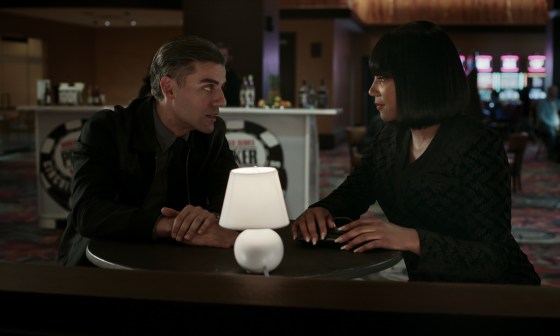September 03, 2021 at 03:35AMStephanie Zacharek
Oscar Isaac, the star of writer-director Paul Schrader’s ardent romantic drama The Card Counter—premiering at the 78th annual Venice Film Festival—is the matinee idol we barely deserve in our short-attention-span world, an era when we barely allow ourselves time to read a face or lose ourselves in a pair of eyes. Yet as soldier-turned-poker-ace William Tell—the finest, silliest pseudonym a fictional poker player has ever chosen for himself, hands down—Isaac demands that we slow down and look. His just-graying hair says, “Don’t wait until tomorrow.” His conscientious-basset-hound eyes say, “Don’t get stuck in yesterday.” He sets the pace for The Card Counter, which is what you might call a pensive fairytale, a story about guilt that can be burned away only with the benediction of love.
[time-brightcove not-tgx=”true”]
That’s a lot of weight for a movie to hold, but if anyone can pull it off, it’s Schrader—not only the writer of Taxi Driver, but the mad brain behind pictures like Patty Hearst, The Comfort of Strangers and First Reformed, movies that command acute attention but give a great deal in return. Schrader’s career has been long, and dotted with highly imperfect pictures. But even a not-great Schrader picture is still more interesting than some movies made by young, so-called geniuses. And The Card Counter, intense and vital and hugely satisfying, is pretty great.
In an early voice-over narration, Isaac’s William Tell explains that he’s done a stint at Leavenworth for a crime he doesn’t immediately describe. All we know is that he kind of liked prison, where he finally got into the routine of reading (“I’d never read a book before. Not all the way through”) and learned another life skill as well: how to count cards. When he’s done with prison, he travels around playing poker for a living, paying cash to flop in cheap motels, whose rooms he immediately redecorates in a manner specific to his liking—it’s best that you see this for yourself. And in these motel beds, he suffers nightmares, hellish visions of torture at Abu Ghraib. William, we learn, was on the side of the torturers, having been trained by a contractor who knew the most evil ways to extract information, Willem Dafoe’s wily, weaselly Major John Gordo. William’s guilt seems to buzz in his head like a low-grade hum, neither dissipating nor rising to the surface, where he might be able to deal with it. Instead, he just keeps playing cards, winning modestly to maintain a low profile.

Then he meets a dazzling young woman: she comes at him in sections, a little like Cyd Charisse angling toward Fred Astaire in The Band Wagon. She goes by the name La Linda, and she’s played by Tiffany Haddish, a cool, funny bombshell—though her earnest, eager face also makes her deeply touching. La Linda wants William to join her “stable,” playing poker for a group of anonymous backers. Around the same time William meets La Linda, he encounters a lost kid—that his name is pronounced Kirk but spelled Cirk with a c is just the beginning of his problems. (He’s played, with sly prevarication, by Tye Sheridan.) William sees the hopelessness of Cirk’s path, and decides to help. Cirk has some debts; if William plays enough poker, he can toss some dough Cirk’s way. He agrees to join La Linda’s stable for just that reason.
By now, everyone who’s ever seen a Paul Schrader movie knows that he favors deep moral explorations, and often writes characters who are obsessed with routines and rituals, ascetics for better or worse. William Tell is one of those characters. What we see less often is Schrader’s romantic streak, visible in movies like the terrific (and little-seen) 1999 romantic melodrama Forever Mine, with Joseph Fiennes and Gretchen Mol. The Card Counter is billed as a thriller, but the love story that shimmers to life, slowly, between William and La Linda is one of its greatest strengths. As these two walk through a park lit by endless strands of colored lights, not yet a couple but getting there, the electricity between them is its own kind of color, an invisible paintbox of attraction. The point isn’t that love can save the troubled hero; it’s that he must save himself in order to feel its grace. Counting cards is much, much easier.
Read more reviews by Stephanie Zacharek
The Card Counter is both unsparing and deeply romantic, the kind of picture we don’t see every day, even at a time when new movies seem to pour into our streaming queues, if not our theaters, at an alarming rate. If nothing else, it’s an entreaty to hold out for quality, for pictures made with thought and care—why go for farmed salmon when you can have the wild? The Card Counter, with Isaac’s superb performance at its heart, might be the movie you didn’t know you were wishing for, coming at a time when wishing for life to restart has become a consuming preoccupation.








